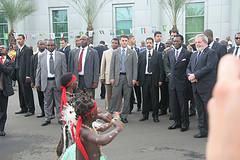 In day 2 of August, President Lula sancionou Law 12305/10 that she regulates the recycling and she disciplines the handling of the solid residues in Brazil. Data of the IBGE pointed that Selective Coleta still was sufficiently incipient in the country. But 7% of the cities had this consolidated process (405 localities). As some of these cities they are populous, 14%de the Brazilian population was taken care of for this process. In the Southeastern region, 48% of the population have implanted selective collection.
In day 2 of August, President Lula sancionou Law 12305/10 that she regulates the recycling and she disciplines the handling of the solid residues in Brazil. Data of the IBGE pointed that Selective Coleta still was sufficiently incipient in the country. But 7% of the cities had this consolidated process (405 localities). As some of these cities they are populous, 14%de the Brazilian population was taken care of for this process. In the Southeastern region, 48% of the population have implanted selective collection.
The Brazilian cities have little more than three years to adjust these services to the new parameters, and this means to construct local proposals from a optics to multidiscipline since the implantation of the PNRS in municipal level, demand the identification of the generated solid residues, and the construction of strategies of specific management (logistic reversa), as well as the definition of favorable areas for the final disposal of the rejeitos. The action of catadores of reciclvel material name for which usually he has been called the workers who live of the resale of these products are inserted in this context and need to be equated if to want to find solutions for the final destination of the garbage, either reusing, reaproveitando or giving it a final disposal. Stories and depositions of workers in the catao of you recycle allow to affirm that this occupation appeared of the necessity of complementation of income for people with survival difficulties. ' ' The cardboard catado and resold guarantee the milk of crianas' ' said Pink D. when it counted to be one of the pioneers and that it was in this work since the decade of 40. At a first moment, these men and women acted individually, without exchange with its pairs and were submitted the proprietors of the scrap iron deposits that not only bought what they got, but defined the value to pay e, in some situations they supplied a wagon and same they allowed it spends the night in the way it collected garbage.
Recent Comments